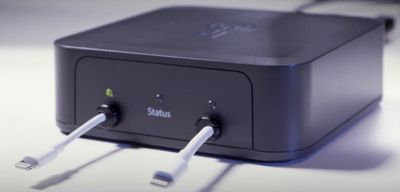New questions have been raised about the FBI's latest request that Apple break its iPhone encryption, after Forbes uncovered a search warrant strongly indicating that federal agents already have tools that can access data on Apple's latest iPhone models.

The report says that FBI investigators in Ohio recently used the GrayKey hardware box to unlock an iPhone 11 Pro Max. The iPhone belonged to Baris Ali Koch, who was accused of helping his convicted brother flee the country by providing him with his own ID documents and lying to the police. He has now entered a plea agreement and is awaiting sentencing.
Koch's lawyer confirmed to Forbes that the iPhone was locked with a passcode when it got in the hands of the FBI and that the code was never revealed to law enforcement, nor was the defendant forced to use his face to unlock the phone via Face ID.
Created by a company named Grayshift, GrayKey is a portable gray box that has previously been used by law enforcement to crack the passcode on iPhones. Complete details on how the latest GrayKey works are not known, although Apple continually works to fix the kinds of exploits used by such devices.
Forbes has previously revealed a GrayKey brochure that showed it worked on older devices, and the two iPhones acquired by the FBI in the most recent Pensacola case are an iPhone 5 and an iPhone 7, which strongly suggests that investigators are already capable of unlocking them.
President Donald Trump and Attorney General William Barr have also weighed in on the latest iPhone encryption stalemate between Apple and the FBI, with both urging the tech giant to assist in unlocking the iPhones used by the Pensacola shooter.
Justice department officials claim to need access to the iPhones to see messages from encrypted apps like Signal or WhatsApp to find out if the shooter discussed his plans or had help. Apple says it has already provided law enforcement officials with information from the shooter's iCloud account, which amounts to all the data in its possession.
Statements by Apple suggest it is gearing up for a battle similar to the one it faced in 2016 in the San Bernardino shooter case, indicating the company has no plans to create a backdoor in its software, regardless of the U.S. government's motives. Apple has previously said that doing so would create "new and dangerous weaknesses" and that weakening security "makes no sense."
Note: Due to the political nature of the discussion regarding this topic, the discussion thread is located in our Political News forum. All forum members and site visitors are welcome to read and follow the thread, but posting is limited to forum members with at least 100 posts.























